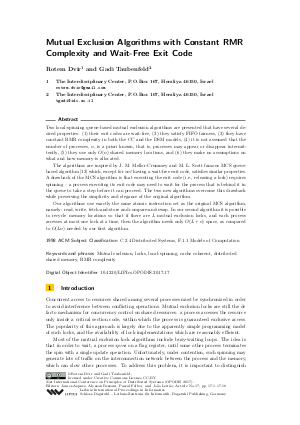Mutual Exclusion Algorithms with Constant RMR Complexity and Wait-Free Exit Code
Authors Rotem Dvir, Gadi Taubenfeld
-
Part of:
Volume:
21st International Conference on Principles of Distributed Systems (OPODIS 2017)
Part of: Series: Leibniz International Proceedings in Informatics (LIPIcs)
Part of: Conference: International Conference on Principles of Distributed Systems (OPODIS) - License:
 Creative Commons Attribution 3.0 Unported license
Creative Commons Attribution 3.0 Unported license
- Publication Date: 2018-03-28
File

PDF
LIPIcs.OPODIS.2017.17.pdf
- Filesize: 452 kB
- 16 pages
Document Identifiers
Subject Classification
Keywords
- Mutual exclusion
- locks
- local-spinning
- cache coherent
- distributed shared memory
- RMR complexity
Metrics
- Access Statistics
-
Total Accesses (updated on a weekly basis)
0PDF Downloads0Metadata Views
Abstract
Two local-spinning queue-based mutual exclusion algorithms are presented that have several de- sired properties: (1) their exit codes are wait-free, (2) they satisfy FIFO fairness, (3) they have constant RMR complexity in both the CC and the DSM models, (4) it is not assumed that the number of processes, n, is a priori known, that is, processes may appear or disappear intermit- tently, (5) they use only O(n) shared memory locations, and (6) they make no assumptions on what and how memory is allocated. The algorithms are inspired by J. M. Mellor-Crummey and M. L. Scott famous MCS queue- based algorithm [13] which, except for not having a wait-free exit code, satisfies similar properties. A drawback of the MCS algorithm is that executing the exit code (i.e., releasing a lock) requires spinning – a process executing its exit code may need to wait for the process that is behind it in the queue to take a step before it can proceed. The two new algorithms overcome this drawback while preserving the simplicity and elegance of the original algorithm. Our algorithms use exactly the same atomic instruction set as the original MCS algorithm, namely: read, write, fetch-and-store and compare-and-swap. In our second algorithm it is possible to recycle memory locations so that if there are L mutual exclusion locks, and each process accesses at most one lock at a time, then the algorithm needs only O(L + n) space, as compared to O(Ln) needed by our first algorithm.
Cite As Get BibTex
Rotem Dvir and Gadi Taubenfeld. Mutual Exclusion Algorithms with Constant RMR Complexity and Wait-Free Exit Code. In 21st International Conference on Principles of Distributed Systems (OPODIS 2017). Leibniz International Proceedings in Informatics (LIPIcs), Volume 95, pp. 17:1-17:16, Schloss Dagstuhl – Leibniz-Zentrum für Informatik (2018)
https://doi.org/10.4230/LIPIcs.OPODIS.2017.17
BibTex
@InProceedings{dvir_et_al:LIPIcs.OPODIS.2017.17,
author = {Dvir, Rotem and Taubenfeld, Gadi},
title = {{Mutual Exclusion Algorithms with Constant RMR Complexity and Wait-Free Exit Code}},
booktitle = {21st International Conference on Principles of Distributed Systems (OPODIS 2017)},
pages = {17:1--17:16},
series = {Leibniz International Proceedings in Informatics (LIPIcs)},
ISBN = {978-3-95977-061-3},
ISSN = {1868-8969},
year = {2018},
volume = {95},
editor = {Aspnes, James and Bessani, Alysson and Felber, Pascal and Leit\~{a}o, Jo\~{a}o},
publisher = {Schloss Dagstuhl -- Leibniz-Zentrum f{\"u}r Informatik},
address = {Dagstuhl, Germany},
URL = {https://drops.dagstuhl.de/entities/document/10.4230/LIPIcs.OPODIS.2017.17},
URN = {urn:nbn:de:0030-drops-86523},
doi = {10.4230/LIPIcs.OPODIS.2017.17},
annote = {Keywords: Mutual exclusion, locks, local-spinning, cache coherent, distributed shared memory, RMR complexity}
}
